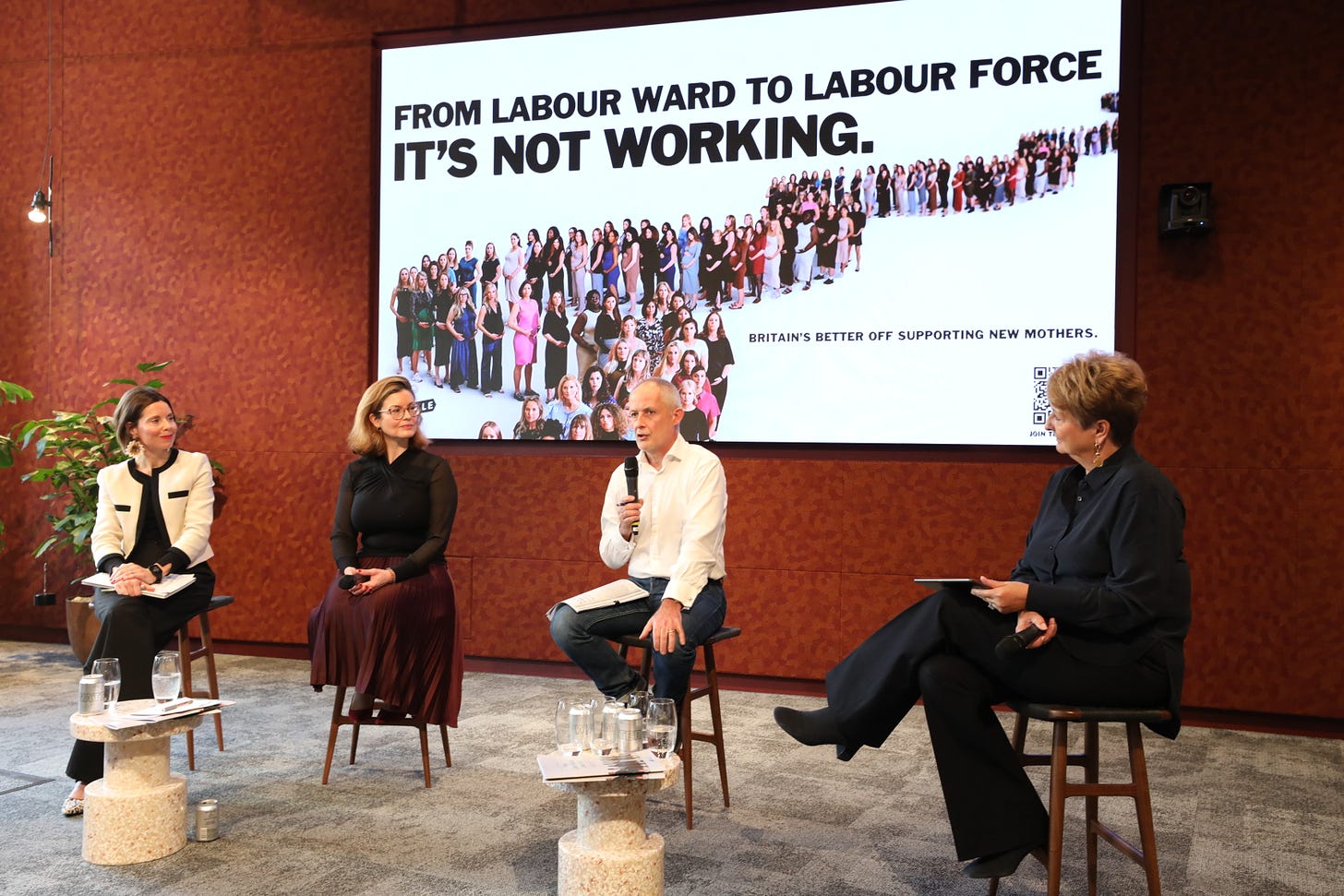The secret to helping mothers at work may actually be helping fathers
Women can feel excluded from the workplace, but men are “trapped by the traditions of yesteryear”, says The Female Lead founder Edwina Dunn
Men taking more parental leave could be the key to keeping new mothers at work and boosting business success, a panel of business and motherhood experts has said.
The panel, at Edelman UK’s London office in November, discussed the findings of The Female Lead and Peanut’s groundbreaking From Labour Ward to Labour Force report, which found that a fifth of returning mothers thought encouraging men to take more parental leave is the best way employers can help mothers at work.
The research spoke to 8,000 mothers who had recently returned to work after a baby, and revealed that more than half weren’t satisfied with the support they got. Of those, a staggering 47% plan to leave their jobs in the next year. Yet it uncovered that when women get the support they need, they are more loyal, more productive and stay at a company longer.
The research reveals women mainly return to work for financial reasons, but close to half said they went back for a sense of personal fulfilment (56%), independence (45%) or to achieve their career goals (44%).
Fathers taking more leave is crucial to helping women transition back to work successfully.
Francesca Woodhouse, Managing Director, UK Workplace Advisory, Edelman UK, said: “If we overlook the role of that birthing partner, then we will lose some of the momentum that we can gain from this research, and the economic benefits.”
“Having fathers being actively involved from the very beginning is incredibly important for the child's development,” said Jessica Chivers, return to work coach and author. “It has a really significant effect on women's careers if we encourage men to take the same amount of leave as women”.
Chivers cited research that found that when fathers are able to take parental leave flexibly in Sweden, prescriptions for antidepressants and antibiotics for new mothers went down. “It’s stressful to be at home by yourself,” she said. “It takes a toll on your health and wellbeing, so it just shows it's all interlinked. We need men taking time off and we need cheaper childcare.”
“There's a lot of evidence that the extent to which fathers are involved in the early years of child rearing affects the stability of the family, and I would argue then that brings stability to society, and all sorts of other benefits,” said David Wreford, a partner at Mercer.
But significant barriers exist to this happening, Wreford explained. “There’s a whole set of societal things which I think need to change, because we have the legal facility to do that [in the UK] with shared parental leave arrangements. but a lot of companies don't advocate it. And then you've got the equal pay issues as well: because men earn more, it's more cost effective for the women to take the leave.”
“If a man is the bigger earner, then it doesn't make sense for him to be away from the workplace,” Chivers added. “But we do need men to be taking shared parental leave. We need much better childcare infrastructure and we need it heavily subsidised.”
One female audience member told the panel: “My husband would have loved to have been at home for a year with the kids, and he would have been a much better parent, but he had no choice.
“I couldn't wait to get back to work. Not all [women] want to be at home, and we've got men that can actually do that job very well, but society and the structure does not enable that right now.”
The panel agreed that social attitudes and workplace culture need to shift to support men taking more leave. Edwina Dunn, founder of The Female Lead, said: “I think if women feel that often they're excluded from some of the dynamics of the workplace, I also feel men are trapped by the traditions of yesteryear.
“We're not going to grow as an economy if we don't keep women in the workplace,” Dunn explained. “We need two adults working per household, even to get on the property ladder.”
Wreford noted that the decision of whether a household moves from 2 to 3 children in the UK can be linked to the affordability of a car: “That's the kind of level of financial discussion that's going on.”
Related Articles
“We really have to consider that the majority of women who are surveyed [in From Labour Ward to Labour Force] are in two-person relationships: 79% are married,” said Woodhouse. “That is how we're living, so we need to factor that in: particularly in those early years of child rearing.”
Wreford said he has seen retail employers that offer “grandparental leave”, and that models of this kind could benefit mothers further as they “return us to thinking about the family not as so nuclear, but having a more extended nature”.
Woodhouse said: “Until we have greater allyship, it's not really going to change.”
But she noted that “take up is increasing year on year” for offers of enhanced parental leave for men or birthing partners, and that the situation for mothers at work in the UK is already radically different today compared to a decade ago.
“Having had two children 14 and 15 years ago, and two children 20 months and three years ago respectively, more flexibility for my partner has made my return to a senior role that is pretty full on, much better. It has been a totally different experience.”
Chivers urged the audience to: “Go and talk to your male colleagues about flexible working and when you know there's an expectant dad around, talk to him about flexible working: ‘Are you taking a shared parental leave? If not, why not?’”
The Female Lead has created an extensive and practical toolkit for employers to support mothers when they return to work.
Download it here and please consider donating to help us continue to conduct research and provide resources to businesses and women around the world.








Supporting men to take parental leave, especially in male dominated occupations and trades, would be a huge step in changing (some of) the cultural factors that make it difficult for women to achieve career success in these occupations!